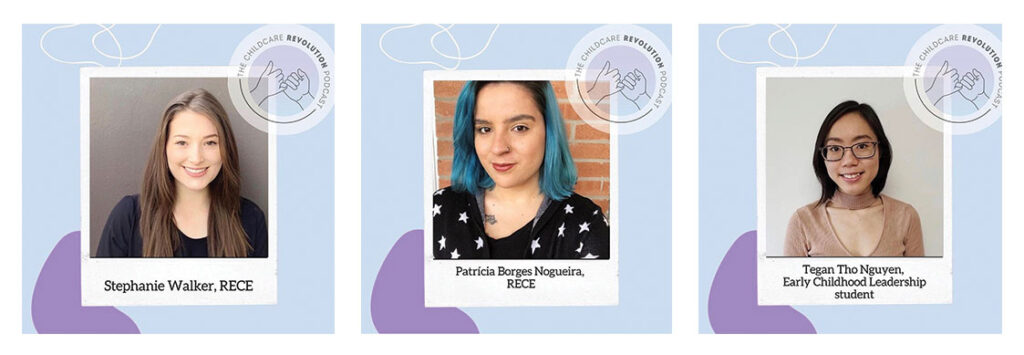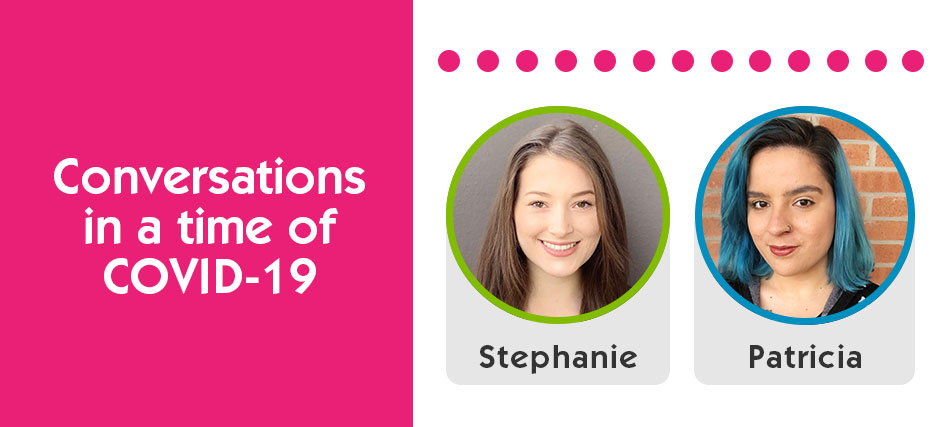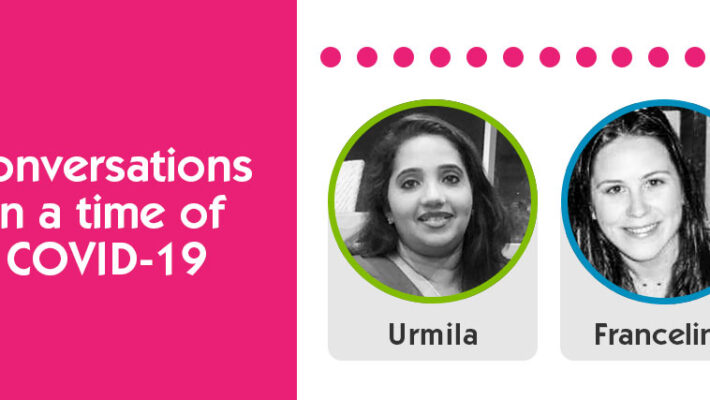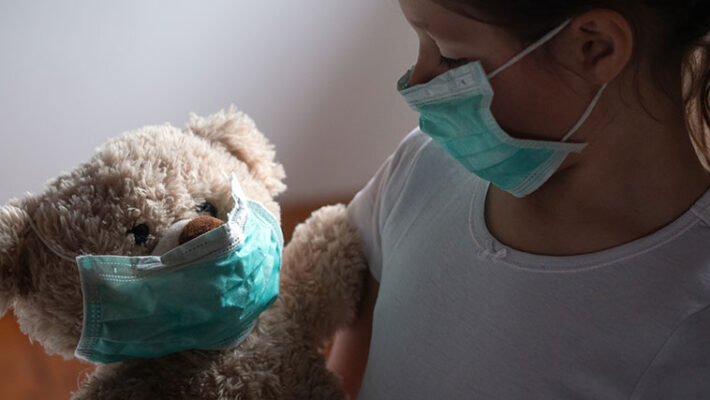This series profiles the experiences of RECEs as they navigate the pandemic.
We interviewed Stephanie Walker and Patricia Borges Nogueira about their experiences and advocacy efforts.
Q: Let’s start with your practice setting. What can you tell us about the work you do?
Patricia: I’m an RECE in a preschool room at a centre in Toronto. I work with two other RECEs and one assistant. We provide care for 16 children. It’s an entirely play-based and child-led emergent curriculum.
Learn more about emergent (play-based) curriculum, inspired by Reggio Emilia, in our Practice Note on Play-Based Learning.
Stephanie: I’m working in a newly built centre in Richmond Hill. I’m one of the RECEs in the toddler program and work alongside one other RECE. We support seven toddlers and use a variety of pedagogies from Montessori, Reggio Emilia and emergent play-based learning
Q: In what ways has COVID-19 affected your professional role, relationships and practice setting?
Stephanie: I was laid off as the centre needed to close for the safety of the children, families and staff. Even though I’m not working, our centre has provided the opportunity to participate in Google Classroom’s remote learning with the children if we wish. There’s no obligation to submit activities, but it’s a good way to stay in touch with the families. We also held a Zoom meeting to connect – it was nice to see friendly faces.
Patricia: We’re currently not required to work from home, even though we’re still on the payroll, for now (thanks to Canada Emergency Wage Subsidy). My employer has made it very clear that the number one priority for staff is to take care of our own physical and mental health. There’s a private social media group where we can check in with the families we normally support, and the channel allows us to communicate with the children via video. I decided to start making videos for the children and posting them online. It’s given me a way to connect with the kids in my class, as I can share the content directly with them and their families.
Q: What are some of the challenges you’re experiencing?
Patricia: One of the biggest challenges is keeping our own mental health in check. The uncertainty of what lies ahead is stressful, especially in a sector that was already hanging on by a thread. We have no idea what child care will look like when we go back to work. What does physical distancing care look like? Will we wear PPE? Are hugs going to be allowed? How are the new health and safety standards and guidelines going to be impacting child-led play? There are a lot of unanswered questions.
Q: Can you tell us about the advocacy work you’ve been doing?
Patricia: I’d always wanted to do something online regarding advocacy in early childhood education and care, but I’d never found the time. Being stuck at home and missing the children I work with made my heart say, “the time is now!” With that, the Instagram account, “Matrisha the RECE”, made its virtual debut. Sharing stories and my practice helps me engage with other educators while also expanding my network – and with it, my knowledge.
Stephanie: Both of us took to social media as soon as our centres shut down and began creating content for families and other RECEs. I created an Instagram account (@stephanie_ece) that allows me to share my personal experiences in early childhood education and my advocacy journey. I’ve also created a YouTube channel where I discuss topics such as self-care for educators.
Q: How can RECEs advocate in the interest of the profession right now?
Stephanie: Get out to social media and start sharing your stories! Our stories are important. They help connect us with others. Meeting other educators and informing the public about the realities of our profession is also extremely powerful.
Patricia: Create opportunities for discussion with colleagues, friends and families outside of the sector. Sign petitions that are making a difference and stay informed. We need to come out of the pandemic with more people understanding that child care is one of the backbones of the economy. Parents and caregivers cannot go back to their jobs without access to full-time care.
Q: Can you share an advocacy story with us?
Patricia: We started talking about making videos together. Maybe one day, a podcast. Then we mentioned the idea to one of our communities of practice. Another member, a student of an early childhood leadership program, Tegan Nguyen, showed interest in joining us on the project. She was the missing piece of our puzzle!

Stephanie: We started the Child Care Revolution podcast. Our goals are to discuss the reality of early learning and care in Ontario, connect with fellow educators and engage with people outside of the sector who may be unaware of the crisis. We’re calling it a revolution because that’s what we need: a child care revolution to better serve children, educators and our communities. This pandemic has given us the time to make the podcast a reality.
Q: Final thoughts?
Patricia: Share your voice and stand up for what you believe in and deserve. Early childhood education and care matter. What we do is so important and all educators deserve professional pay and decent work.
Stephanie: We believe we’ll have that one day, but for that to happen, we need to be seen and heard. Every little bit of action counts towards making a better system for educators, children and their families.
Interested in learning more about advocacy in the profession? Check out our Connexions article on advocacy.




